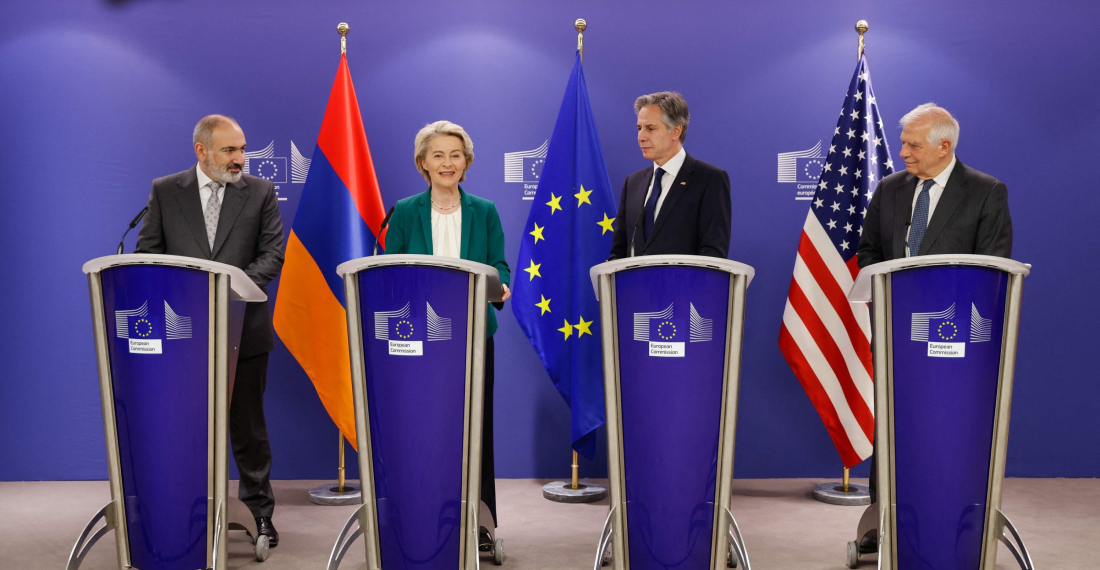On 5 April, the long-awaited summit between Armenia, USA, and the EU took place in Brussels, where the parties were represented by Prime Minister Pashinyan, State Secretary Blinken and President of the European Commission von der Leyen, respectively. And while expectations had been high in Armenia, the final communique turned out to be rather modest, pledging “growing support to Armenia's democratic and economic resilience, backing the country's efforts for more food security, digital infrastructure”, assistance to Armenians who moved in the late 2023 from Karabakh, and envisaged the provision of a rather modest financial assistance- $70 million from Washington and a 4-year instalment to the total of EUR 270 million from Brussels. In general, the statement suggests a steady expansion of the parties’ cooperation rather than a decisive step on the way of European integration for Yerevan, expected by many. That’s why it was met with a mixed reaction in Armenia: many commentators expressed their disappointment and even fears that Yerevan is risking retaliation from Russia without receiving any tangible help from the West.
Still, Baku had been rather bitter about the summit, and didn’t hesitate to express it via official statements. Among the reasons of its irritation, Azerbaijan mentioned its perceptions that the meeting held without Baku “excludes” it and “draws dividing lines in the region”, while it can also encourage Yerevan to further delay concluding the peace agreement and instead build up its muscle with the Western assistance and security guarantees, further prolonging the standoff between the countries. Azerbaijani media claimed that some secret agreements could have been made in Brussels regarding security support to Armenia from the US and EU, including military capability buildup and weapons supply. Baku’s frustration even urged Mr. Blinken and Ms. Von der Leyen to call President Aliyev on the eve of the meeting on April 4, reassuring him that its agenda has no anti-Azerbaijani elements, while they also discussed prospects for further cooperation and expressed readiness in assisting Azerbaijan on humanitarian issues, including its de-mining efforts in the liberated territories. Notably, no sharp reaction followed from the Western capitals to Baku’s remarks, instead they reiterated support to the peace process in the South Caucasus, while Mr. Blinken specifically emphasized the imperative of reaching sustainable peace with Azerbaijan for Armenia’s development. However, these remarks triggered a fresh wave of allegations that Baku has joined efforts with Russia to fight Western presence in the region and for this end is torpedoing the peace process.
But what considerations, in reality, caused this negative reaction from Baku, which was rather unexpected given certain recent progress in the negotiations with Armenia? While official statements look deliberately vague, Azerbaijan indeed has several legitimate concerns. First of all, the current geopolitical balance in the region is incredibly fragile. Baku’s strategy has long been based on keeping this thin red line between various geopolitical actors, which is becoming increasingly difficult with the intensification of the struggle between Russia and the West. Yerevan’s open Westward drift may instigate Moscow to interfere into Armenia’s affairs with the purpose of changing the government, which may bring nationalist forces back into power. In this scenario, all the progress achieved after 2020 can be lost, setting a stage for a new round of conflict. At the same time, growing Western role in Armenia- especially if it includes a tangible security component- shall encourage Tehran to take a more confrontational stance, as recently expressed by the prominent Iranian statesman and diplomat Ali Akbar Velayati in his article. This response may well include an attempt to block the Zangezur road, the prospect of which remains an irritating factor for the Iranian leadership. Also, at the moment when Baku’s connectivity potential has turned into one of its foreign pillars, new major armed disruptions in the region can be a very negative scenario. Finally, Azerbaijan is wary of a likelihood of France monopolising European policy on the Armenian dimensions, since Paris is more motivated to actively engage in the regional affairs than most of its Western partners. While the EU in general has been taking a much more balanced and fair position on this issue, the risk is that at some point Armenian policy may be de-facto delegated to France, which would almost certainly ensue a confrontational approach towards Baku.
Indeed, some rather unexpected developments between Baku and Yerevan occurred following 5 April. First, some intensive shooting was observed along the border on the night between 5 and 6 April, but despite aggressive rhetoric, no casualties happened and there were no serious repercussions. Then, on 10 April, following an accident when an Armenian shepherd entered Azerbaijani territory with a flock of sheep, Armenian border guards opened fire, wounding an Azerbaijani serviceman. However, in contrast to similar occasions in the past, no retaliation happened- instead, the Armenian Ministry of Defense initiated an investigation, claiming that the officer who made a shot was responsible for acting without an order and trespassing his duties, while Baku quietly returned the shepherd with his herd to Armenia. Maybe even more importantly, in his recent speeches Pashinyan proceeded to challenge some fundamental narratives of the Armenian nationalism, claiming that “the real Armenia” is in conflict with “the historic Armenia” and the former has to demarcate its boundaries with the latter in the same way as it is planning to do it with Azerbaijan on the ground. Later, speaking about the events of 1915, he avoided using the term “genocide” and mentioned a prospect of using archives to carefully examine those events, infuriating Armenian nationalists. Finally, on 19 April, Armenia and Azerbaijan announced progress in the process of the border demarcation between the two countries, which will result in four Azerbaijani villages that had been under Armenian control for the last three decades, reverting back to Azerbaijan
One of the implications of this sequence of events is that Pashinyan understands very well that any steps towards European and in general, Western integration, must be coupled with the genuine normalization process with Azerbaijan and Turkey, including also painful concessions on the issues foundational for the current Armenian statehood. Thus, we may expect that the withdrawal of Armenian villages from four occupied Azerbaijani villages, moves to amend Armenian constitution in the way eliminating any legal claims on Karabakh, and some tangible progress in the process of border delimitation, in the nearest future. On the other hand, when it comes to Baku, there are many reasons to think that it has been deliberately exaggerating its concerns with the 5 April summit with the purpose of creating an illusion of its siding with Russia. Azerbaijan is wary of the fact that Moscow would like to use it to “punish” Armenia, and while it has no intention to do so, sustaining this illusion may also help to convince Yerevan not to delay peace process and to finally agree on Baku’s terms.






